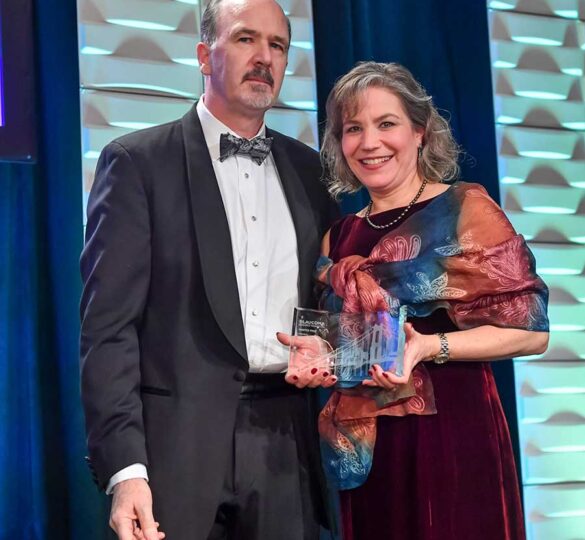Carla Siegfried, MD: Innovative Glaucoma Research
"I became interested in glaucoma because I liked the long-term aspect of it. It is through that long-term relationship that we can really get to know our patients and help them." — Carla Siegfried, MD

For her research project exploring the role of oxygen and antioxidant levels in the eye, Dr. Carla Siegfried (Washington University School of Medicine, St. Louis) was awarded the 2018 Shaffer Prize for Innovative Glaucoma Research.
The Shaffer Prize, presented annually by Glaucoma Research Foundation, recognizes a researcher whose project best exemplifies the pursuit of innovative ideas in the quest to better understand glaucoma.
In this video, Dr. Siegfried talks about her research into oxidative stress, how it relates to glaucoma, what inspired her to investigate glaucoma, and how glaucoma patients might ultimately benefit from her research.
Video Transcript
Carla Siegfried, MD: This is an amazing honor. I have been working in the field of glaucoma for 25 years now. I entered into the field of research in a backwards way as I was in the field of just clinical work for nearly 15 years. Then only in the last 10 years or so have I been involved in research. To receive this prize as a result of my work with the Shaffer Grant is truly an amazing honor and really shows that innovative research can move things forward. We can move the needle. We can make things better for our patients by understanding this very complex disease.
Oxidative stress refers to the way cells are managed and essentially damaged by chemicals that are released or are formed from oxygen. If there’s too much oxygen, too much of a good thing, there’s these compounds called reactive oxygen species which cause damage to cells. It has been known for many years that oxidative damage in the cells of the drain of the eye, the very specialized cells of the trabecular meshwork, play a role in the development of this disease. This all started from our research looking at oxygen levels inside the eye. We actually took a probe and measured oxygen within the eye. Our discoveries showed that certain surgical procedures, mainly removal of the lens of the eye, and removal of the gel in the back of the eye, alters the levels of oxygen in the eye, and specifically in the area of the drain of the eye. We proposed that this may be a factor as a source of these oxidants and reactive oxygen species that could damage these cells.
We also found that there’s an increase in oxygen in African Americans in all locations of the drain of the eye and throughout the front of the eye. We questioned whether this was also a factor as to why African Americans develop glaucoma at a much higher rate with a much higher risk of blindness in their life. Our research has actually now taken another step. Through the funding from the Shaffer Grant, we have been fortunate to refine our techniques of removing this area of cells, the trabecular meshwork cells, and using these specimens to look at how the genes are changed in glaucoma in the tissue. We know about genetic differences in the blood, the whole genome, but now we’re learning about genetic differences in this very specialized tissue. We’ve now identified a protein that is expressed differently in people with glaucoma and African Americans with glaucoma. This could be a source of therapy, potentially even gene therapy someday to alter that expression.
I became interested in glaucoma when I was a resident at University of Illinois. I liked the long-term aspect of it. I love the continuity of care. I love seeing patients forever. I’m not into performing a surgical procedure and never seeing them again. It is through that long-term relationship I think we can really get to know our patients and help them. That is how I came into the field of glaucoma.
I’ve had incredible mentors. I think mentors are what make us who we are, the concept of standing on the shoulders of giants. After coming to Saint Louis and Washington University, Bernie Becker was the father of glaucoma. Just as Dr. Shaffer was out here on the west coast, Dr. Becker was in the Midwest and has an incredible legacy of other glaucoma specialists spread across the country. Curiosity was really the aspect that helped me to go down a path of research and want to discover more about how we can treat glaucoma, how we can take better care of our patients.
First posted on August 17, 2018; Reviewed on May 19, 2022